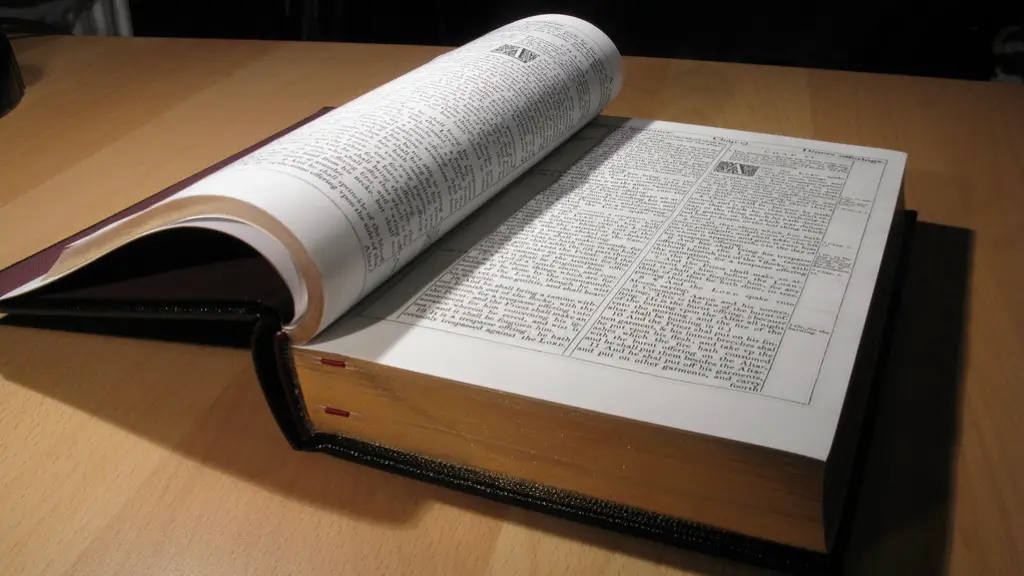ZIon is a term that appears in the Bible over two hundred times and is found in many verses. The most famous reference is in the song of Solomon, “The LORD hath chosen Zion; he hath desired it for his habitation.” (Psalms 132:13). It is important to understand the meaning of Zion in the Bible because it defines one of the major themes.
Biblical scholars agree that Zion is an expression of joy and hope for the nation of Israel. It is a metaphor for a time of great national prosperity and spiritual abundance. The prophet Isaiah used the term to describe a time when Jerusalem and the Temple would be restored and the people of Israel would be reunited. The book of Isaiah even links Zion to the “glorious mountain” which is believed to be the Mount of Zion, the site which gave rise to the name.
The term Zion is also found in other Old Testament passages. It is used to describe a symbol of hope and security, a refuge in times of trouble. It is a place of safety where the people of Israel can go when they are persecuted or oppressed. The prophet Micah links Zion to a time when “the Lord shall make her wilderness like Eden”.
In many ways, Zion symbolizes the ultimate goal of the nation of Israel; that is to be the the place of holiness, rejoicing and justice. As the prophetic books of the Old Testament tell us, Zion will one day be restored, and the people of Israel will have a new nation in which to live and worship. The book of Isaiah also suggests that the nations of the world will come to Zion in order to see the glory of God.
The term Zion is also used in the New Testament. It is found in the letter to the Hebrews, stating that Jesus is our Zion, the city of God and the dwelling place of his people. The New Testament also talks of how Jesus will reign over the New Jerusalem in the end days, when evil is finally destroyed and all will be under the rule of God.
Application of Zion in Culture
The importance of Zion in the Bible has been reflected throughout Christian culture. Church leaders have viewed Zion as a representation of the church and the people of God. It has been an inspiration for hymns and art, with many churches and cathedrals referring to Zion in their names. As Christianity spread to different parts of the world, Zion has been seen as a symbol of divine protection, justice and peace.
Zion has also had a major influence on the spiritual lives of individuals. People often turn to Zion in difficult times, searching for comfort, hope and assurance. It is seen as a reminder of God’s faithfulness and mercy, a symbol of an eternal home where justice and peace will reign.
In the modern era, Zion has taken on political and social meaning. The establishment of the independent state of Israel in 1948 was a fulfillment of the Zionist dream and many people around the world have identified with the idea of a safe haven for persecuted Jews. Zion has been adopted by some as the national anthem of Israel and it is seen as a sign of hope for the Jewish people.
Political Meaning of Zion
In recent years, Zion has become a symbol of the struggle of the Israeli-Palestinian conflict. For some, Zion has become a symbol of hope and freedom as Israelis continue to fight for their right to a homeland. On the other hand, Zion is viewed by some as a weapon of oppression and symbolic of the occupation of Palestine. It has become a rallying cry for both sides of the conflict and a source of great political tension throughout the Middle East.
Regardless of one’s views on the political implications of Zion, it is clear that this term has great significance in both the Bible and in its cultural context. Zion is a sign of hope, peace and justice that can provide comfort and assurance to people throughout the world.
Zion as a Biblical Vision
The Bible tells us that Zion is an expression of joy and hope for the nation of Israel. It represents a time of national prosperity and spiritual abundance. Zion is a metaphor for the ultimate goal of the nation of Israel: a place of holiness, rejoicing and justice. As the prophet Isaiah wrote, “The Lord hath chosen Zion; he hath desired it for his habitation.” (Psalms 132:13).
Throughout its history, Zion has been a source of comfort and assurance to the Jewish people. It represents a refuge in times of trouble and a place of safety during persecution. It is a reminder of God’s faithfulness and mercy, a symbol of an eternal home where justice and peace will one day reign.
Today, Zion has been infused with political sentiment and many people around the world identify with the idea of a safe haven for persecuted Jews. It is a powerful symbol of the struggle for justice and freedom in the Israeli–Palestinian conflict. Whether one aligns themselves to one side or the other, both sides have adopted Zion as a rallying cry for their cause.
Historical Background of Zion
Zion is a term that appears in the Bible over two hundred times, primarily in the Old Testament. The most famous reference is in the song of Solomon, “The LORD hath chosen Zion; he hath desired it for his habitation.” (Psalms 132:13). This one line speaks of God’s will for the nation of Israel to return to its rightful glory, with Zion being the divine home of the Jewish people.
Zion is mentioned in other Old Testament passages as well. The prophets Isaiah, Amos, and Micah talked of a time when Jerusalem and the temple would be restored and Israel would be reunited. It was seen as a symbol of hope and security, a refuge in times of trouble. By the time of the New Testament, Zion had taken on a spiritual meaning, as Jesus was said to be our Zion, the dwelling place of God and his people.
Since then, Zion has been adopted as the national anthem of Israel, seen as a symbol of divine protection, justice and peace in Christian culture. It has become a rallying cry for both sides of the Israeli–Palestinian conflict, a source of great political tension throughout the Middle East. Regardless of one’s views on the political implications of Zion, it is clear that this term has great historical and cultural significance.
Theology behind Zion
At its core, the theology behind Zion is one of hope and justice. It is ultimate goal of the nation of Israel to be the dwelling place of holiness, rejoicing, and justice. As God promised through the prophet Isaiah, “I will create a new heavens and a new earth, and the former shall not be remembered, nor come into mind.“ (Isaiah 65:17). Zion is a symbol of that hope, a reminder of God’s faithfulness and mercy and the hope of an eternal home where justice and peace will reign.
For centuries, Zion has served as an inspiration for both Jews and Christians in different parts of the world. It has been a source of comfort and assurance for individuals, a reminder of God’s goodness and faithfulness. Zion has become a powerful symbol of the struggle for justice and freedom in the Israeli–Palestinian conflict. It stands as a reminder of our shared hope for a better future, a future that is built on justice, peace, and God’s sovereignty.




